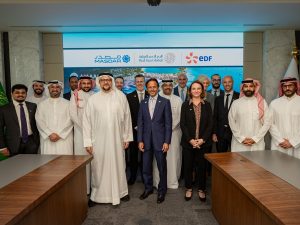The World Travel & Tourism Council (WTTC) launched the second edition of its groundbreaking Net Zero Roadmap for Travel & Tourism, revealing the number of global Travel & Tourism businesses setting climate targets has surged by 27% in the past three years, with more than half now actively committed to emissions reduction. Launched at COP29 in Baku, Azerbaijan, the report reveals, 53% of the 250 leading Travel & Tourism businesses analysed have now set climate targets, a significant increase from 42% in 2021, when the first Net Zero Roadmap was created. Among these businesses, one third have committed to Science-Based Targets initiative (SBTi) goals, underscoring their dedication to meeting rigorous emissions reduction benchmarks. Notably, the number of companies adopting SBTi targets has more than doubled since 2021, signalling an accelerated effort by the sector to align with global climate standards. Developed in collaboration with Accenture, endorsed by the United Nations Framework Convention on Climate Change (UNFCCC), and supported by the State Tourism Agency of the Republic of Azerbaijan, this second edition of the roadmap underscores the urgency of climate action as the sector works towards net zero by 2050. Building on the foundation of the original roadmap launched in 2021 at COP26, in Glasgow, Scotland, the latest edition addresses the escalating environmental impacts on tourism. It introduces an enhanced decarbonisation framework, including new target corridors to guide Travel & Tourism businesses in setting ambitious, actionable climate targets. The roadmap highlights that there is no ‘one size that fits all’ solution, as each industry faces its own challenges, with some able to meet their net zero targets earlier than others. A major focus of the updated roadmap is improving sector alignment and transparency, particularly as demand …
Read More »IATA releases enhanced policy and finance net zero roadmaps
The International Air Transport Association (IATA) released updated Policy and Finance Net Zero Roadmaps, containing expanded and deepened analyses, bringing into focus four key conclusions: • The air transport industry’s energy transition is feasible on the 2050 horizon. • The amounts of investments needed to make that possible are comparable to those engaged in previous creations of new renewable energy markets. • Success in the transition depends critically upon policymakers’ unity of purpose. • The time left for joining forces in air transportation’s energy transition is shrinking by the minute. Every action delayed is an opportunity missed. “The updated IATA Policy and Finance Net Zero Roadmaps make it clear that decarbonization by 2050 is possible. They also sound a warning bell that, to achieve this, all stakeholders, particularly policymakers, must collaborate more broadly and act with greater urgency. To be successful, we need clear policy and financial frameworks that will support air transportation’s needs in a way that is realistic and coherent with the massive changes that must take place simultaneously in all economic sectors,” said Willie Walsh, IATA’s Director General. The Policy Roadmap emphasizes the importance of strategic policy sequencing and addresses the need for global collaboration, including beyond the aviation sector. The recommendations recognize that there is no one-size-fits-all solution, and policies must ensure that all countries can participate in the future global Sustainable Aviation Fuel (SAF) market. Highlights include: • Immediate Action is needed to unlock the Carbon Offsetting and Reduction Scheme for International Aviation (CORSIA) Eligible Emissions Units (EEUs) and prioritizing SAF in the product mix at refineries. • Strategic Policy Sequencing combining technology-push and demand-pull measures will be critical. Moreover, governments must foster global, liquid, …
Read More »Industry leaders to discuss the pathway to net zero at FHS World
This year’s Future Hospitality Summit World to be held in Dubai from 30 September to 2 October will focus on industry leaders discussing pathways to net zero and what the industry can do further in order to balance and maintain standards of the industry. TravTalkME as media partners for the event will be looking at conducting interviews with the key leaders of the industry who can share in depth details on how the industry thrives on ESG practices. From decarbonisation to data management and sustainability to staff training, ESG is at the top of the hospitality sector’s agenda, with People, Planet and Profit a key conference track at the upcoming FHS World. With input from Inge Huijbrechts, Chief Sustainability and Security Officer, Radisson Hotel Group; Duncan O’Rourke, Chief Executive Officer, Premium, Midscale & Economy Division Middle East, Africa & Asia Pacific, Accor; Richard Williamson, Chief Operating Officer, Considerate Group; Guy Hutchinson, President, Middle East & Africa, Hilton, and Dr. John Blakey, CEO, Executive Coach and Founder, The Trusted Executive. According to Inge Huijbrechts, Chief Sustainability and Security Officer, Radisson Hotel Group, the transition to a net zero and equitable hotel industry is essential. “Hotel groups need to use proven, transparent and verifiable methodologies to collect data and calculate their scope 1, 2 and 3 carbon footprints. The focus here is increasingly on auditability of the data and the decision processes, for example as prescribed in regulations such as CSRD. The next step is setting targets to move towards net zero, and report progress regularly. A widely recognized framework is SBTi – the Science Based Targets Initiative. Part of the data for any company will be a combination of accurate actuals and …
Read More »Red Sea Global announces drive to achieve zero carbon footprint
The new partnership will drive towards achieving a zero-carbon footprint in the destination; Red Sea Global (RSG), Amaala and The Red Sea, has entered into a 25-year concession agreement with the French multinational electric utility company EDF (Électricité de France) and leading clean energy company Masdar on a multi-utilities infrastructure facility to service the Amaala destination. Like its sister destination, The Red Sea, Amaala will be powered entirely by solar energy, saving the equivalent of nearly half a million tons of CO2 emissions every year. The new facility consists of an optimized off-grid renewable energy system, which generates energy from photovoltaic technology, and a battery energy storage solution that enables 24/7 power, plus a desalination plant and wastewater treatment plant, both powered by renewables. “Sustainability is a cornerstone of Amaala, and our new partnership with EDF and Masdar will drive us towards achieving a zero-carbon footprint once fully operational. The project follows the template for success provided by The Red Sea, where we recently completed the build of five solar farms, procuring a destination-wide utility system that enables us to operate with no connection to the national grid,” said John Pagano, Group CEO of Red Sea Global. Amaala’s renewable supply system has the capacity to generate up to 410,000 MWh per annum – enough to power 10,000 households for an entire year. The system includes a 700 MWh battery storage facility, which ensures Amaala will be powered by renewables, day and night. There will also be a water desalination plant that uses reverse osmosis technology and has a capacity of 37 million liters of water per day. The contract was procured in the model of an independent public-private partnership (PPP), …
Read More »ATM 2024 to take place from 6th to 9th May exploring how entrepreneurship is empowering innovation in the Middle East’s travel industry
Arabian Travel Market has unveiled its next theme: ‘Empowering Innovation: Transforming Travel Through Entrepreneurship.’ The 31st edition of the show will take place at Dubai World Trade Centre (DWTC) from Monday 6 to Thursday 9 May 2024. Over the last 15 years, the travel and tourism industry has secured only 1 percent of total funding for startups across all industries, according to analysis from McKinsey. This is despite the fact that the sector accounted for more than 10 percent of global GDP in 2019. With exhibitors from the fields of aviation, accommodation, hospitality, attractions, technology and more, ATM 2024 will explore how innovators in the travel and tourism space are working to attract greater levels of funding to further increase the sector’s overall contribution to global GDP. The 31st edition of ATM will once again host policymakers, industry leaders and travel professionals from across the Middle East and beyond, encouraging them to forge new relationships, exchange knowledge and identify innovations with the potential to reshape the future of global travel and tourism. From startups to established brands, the upcoming show will highlight how innovators are enhancing customer experiences, driving efficiencies and accelerating progress towards a net-zero future for the industry. Danielle Curtis, Exhibition Director, Arabian Travel Market, said: “The Middle East’s travel and tourism sector has demonstrated impressive resilience and growth in recent years, but we must continue to innovate and adapt in order to achieve the industry’s long-term goals. Thanks to ATM 2024’s theme, ‘Transforming Travel Through Entrepreneurship’, we have a golden opportunity to showcase expert insights, cutting-edge technologies and commercial opportunities with the potential to completely reshape the sector.” Building on ATM 2023’s theme of ‘Working Towards Net …
Read More »Canal Central Hotel Business Bay posts significant progress towards net-zero carbon emissions during H1 2023
Canal Central Hotel Business Bay announces its outstanding achievements in reducing carbon emissions during the first half of the year. Using Dubai’s Department of Economy and Tourism Carbon Calculator to measure and guide its efforts in achieving environmentally responsible operations during this period, Canal Central Hotel Business Bay has achieved substantial reductions in carbon emissions across various key performance indicators (KPIs), marking a significant step toward its sustainability goals. The results are as follows: Electricity: The hotel achieved an impressive 1.07% decrease in electricity consumption which is attributed to a series of energy saving initiatives implemented by the property including the installation of sensor-based lights in guests’ corridors, the implementation of a guest room power-saving mode via a Room Management System, the transition from conventional CFL lights to energy-efficient LED lights throughout the property, and the introduction of an auto shut-off mechanism for operational equipment. Water: Canal Central Hotel Business Bay proudly reports a reduction of 1.16% in water consumption. The hotel’s commitment to responsible water management is evident in its adoption of best practices, including the utilization of aerators in washroom faucets to regulate water flow and mitigate wastage. District Cooling: An impressive 0.67% reduction in carbon emissions related to district cooling has been accomplished by utilizing a central air conditioning system that efficiently cools the entire building. This technology allows the property to maintain comfortable temperatures while minimizing energy consumption. Liquefied Petroleum Gas: The hotel has effectively managed LPG consumption by optimizing food service operations. Buffet offerings are meticulously planned based on the in-house nationality mix and expected guest numbers, reducing excess food production. Additionally, the hotel has replaced buffets with set menu options during periods of decreased …
Read More »Oman Air takes next step towards sustainability with plastic-free initiative
As part of its ongoing commitment to sustainability, Oman Air has replaced the plastic used to wrap blankets and mattresses in its premium cabins with an eco-friendlier paper-based alternative. All duvets and mattresses across the airline’s fleet will now be presented to the guests with slim, branded paper bands, resulting in the reduction of up to 21.6 ton of plastic per year. The initiative is the latest step for Oman Air as it continues to work towards phasing out the use of single-use plastics on board. Captain Nasser bin Ahmed Salmi, Acting Chief Executive Officer at Oman Air, said: “In a concerted effort guided by our in-house experts and bolstered by collaborations with partners and vendors, we have successfully achieved another milestone in our sustainability efforts. This pivotal step aligns seamlessly with our corporate strategy to reduce waste and choose more environmentally friendly products, reflecting our commitment to national sustainability goals.” Oman Air has been making steadfast strides in reducing its on-board plastic consumption over the last few years, including removing the plastic sleeves used to load cutlery and reducing plastic water bottles and cuplets by up to 50% on certain routes. This year, it has also replaced 80% of its in-flight service carts with lightweight alternatives, providing a considerable boost to fuel efficiency. Meanwhile, Oman Air’s continual efforts to minimise its environmental impact is demonstrated through a range of initiatives that underscore its dedication to promoting sustainable aviation practices.
Read More »Middle East hotels need to reduce their carbon emissions by two thirds within seven years to help prevent irreversible climate change
UAE-based smart and green facilities management company Farnek has launched a new state-of-the-art online remote digital platform called PowerTek, which was developed by in-house experts, at Farnek’s innovative digital solutions, sister company HITEK. The comprehensive and data-driven energy performance monitoring tool supports hotels and the wider business community, through efficient measuring, tracking, monitoring and benchmarking of energy and water consumption as well as waste management. “This analysis helps to reduce carbon emissions, which are key to fulfilling any roadmap towards net zero,” said Nadia Ibrahim, Director – Consultancy & Sustainability at Farnek. PowerTek analyses consumption and waste, with respect to multiple variables that can influence a hotel’s environmental metrics such as occupancy, guest nights, number of guest rooms, F&B covers, guest profiles, staff hours, air-conditioned areas as well as general weather conditions. This helps hotels to maintain higher operational efficiency, lower costs and the associated carbon emissions. “Following the science, to prevent irreversible climate change, we must restrict the global increase in temperature to 1.5°C. To achieve this, the net emissions of greenhouse gases (CO2e) will need to be reduced by up to 50% by 2030 and reach net zero levels by around 2050. “Putting that into perspective, according to an international study by Sustainable Hospitality Alliance, the hospitality industry needs to reduce its carbon emissions by 66% per room by 2030, and by 90% per room by 2050. Currently the hospitality industry is responsible for 8% of global greenhouse gas emissions. “These statistics clearly underscore the urgency of combatting climate change. Hotels have just seven years to reduce their emissions by nearly two thirds,” added Ibrahim. According to Farnek’s analysis, which uses data from its own hotel clients as well as …
Read More »Arabian Travel Market 2023 to make Net Zero pledge
Arabian Travel Market (ATM), the leading travel and tourism event for inbound and outbound tourism professionals throughout the Middle East, has announced that ‘Working Towards Net Zero’ will be its official theme for ATM 2023, which takes place at the Dubai World Trade Centre on 1-4 May. RX (Reed Exhibitions), the organiser of ATM, will celebrate its 30th annual event by unveiling a dedicated sustainability pledge, not only to make the ATM 2023 event more sustainable but to announce 30 long-term goals as ATM works towards net zero in line with the RX Global pledge. Danielle Curtis, Exhibition Director, Arabian Travel Market, said: “If the UAE and the wider Middle East are to achieve their net zero ambitions, the travel and tourism industry will play a vital role, given its share of regional economic activity and of course its growth potential. With COP27 being held in Sharm El Sheikh this year and COP28 in Dubai in 2023, it is essential that hotels, airlines, leisure resorts and all associated companies start to put their sustainability strategies in place. While unveiling our strategic path to net zero, ATM 2023 will also provide an ideal platform for industry players to engage with sustainability experts and their peers to address the challenges of achieving net zero.” According to a World Travel and Tourism Council (WTTC) report, travel and tourism account for between 8-11% of the world’s emissions. It also revealed that 42% of the travel and tourism businesses analysed currently have publicly announced climate targets, 61% of travellers say they want to travel more sustainably in the future and over 80% of travellers plan to prioritise sustainability in their travels in the coming year. …
Read More »Independent hotels in GCC will need support to achieve Net Zero emissions by 2050 says Farnek sustainability expert
Nadia Ibrahim, Associate Director of Consultancy & Sustainability at leading UAE-based smart and green facilities management (FM) company Farnek, has revealed how all hotels throughout the region can create a bespoke roadmap to achieve Net Zero emissions by 2050. During her webinar presentation in conjunction with the Swiss Business Council, which was attended by key hospitality figures from across the region, Ibrahim highlighted the fact that some international hospitality brands may already have strategies in place to achieve their Net Zero ambitions. However, many independent hotels, particularly three and four-star properties would require external support from consultants to design, plan and execute a carbon neutral roadmap. “Major international hotel brands such as Accor, Hilton and Marriott have the necessary resources to achieve their sustainability goals, but many privately-owned independent hotels will not have the means to access dedicated internal support. “There is also general confusion about what Net Zero means and the process and actions required to make a corporate commitment and how a hotel’s carbon footprint can be measured and reduced without affecting the operation or guest experience,” said Ibrahim. It is widely reported that tourism and specifically hotels account for 8% and 1% respectively of total global carbon emissions. But implementing a carbon reduction plan is not an easy task, with multiple internal and external challenges. The most common of which are carbon footprint assessments across the hotel and its value chain, a lack of financial resources with little or no budget allocated for climate related activities, the higher costs associated with sustainable products and insufficient regulatory incentives to support a hotel’s Net Zero transition. Ibrahim, who was elected to the board of the official Local Network of …
Read More » Tourism Breaking News
Tourism Breaking News








